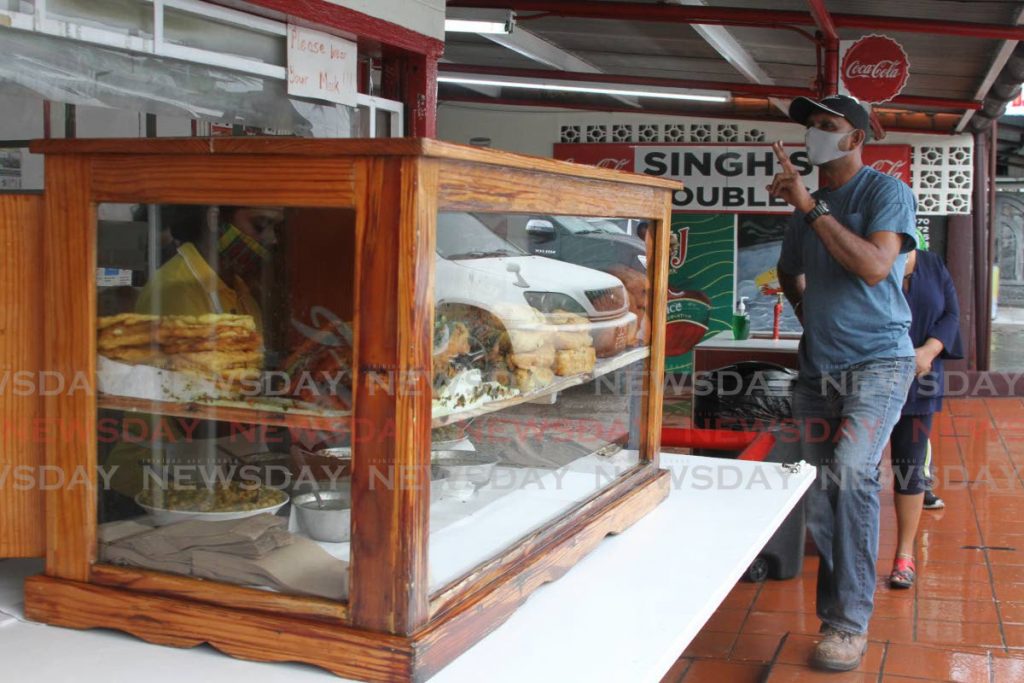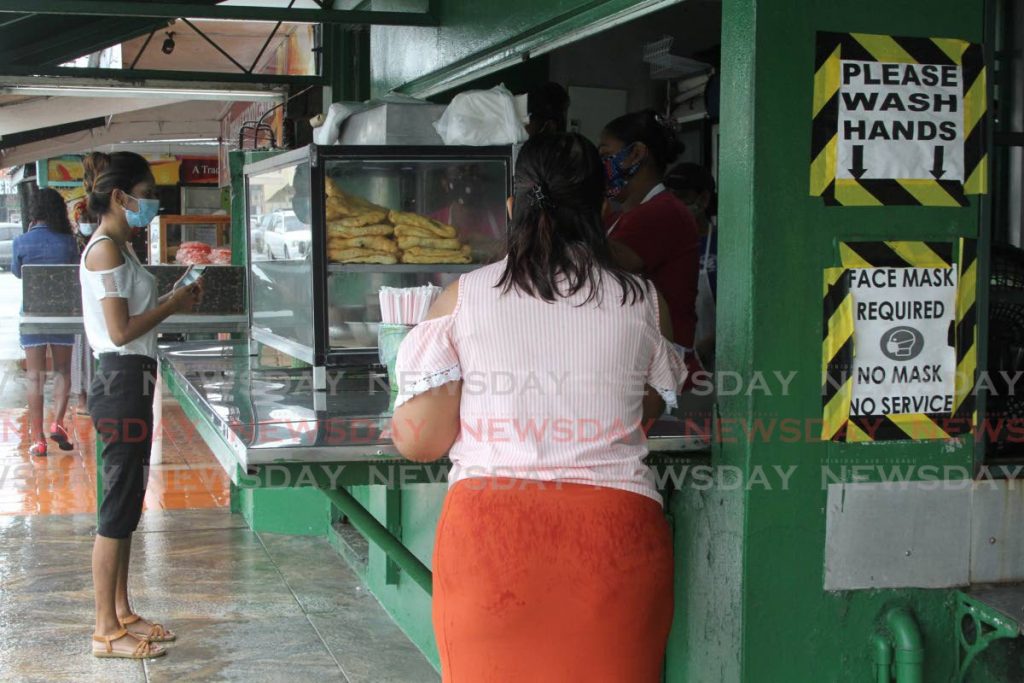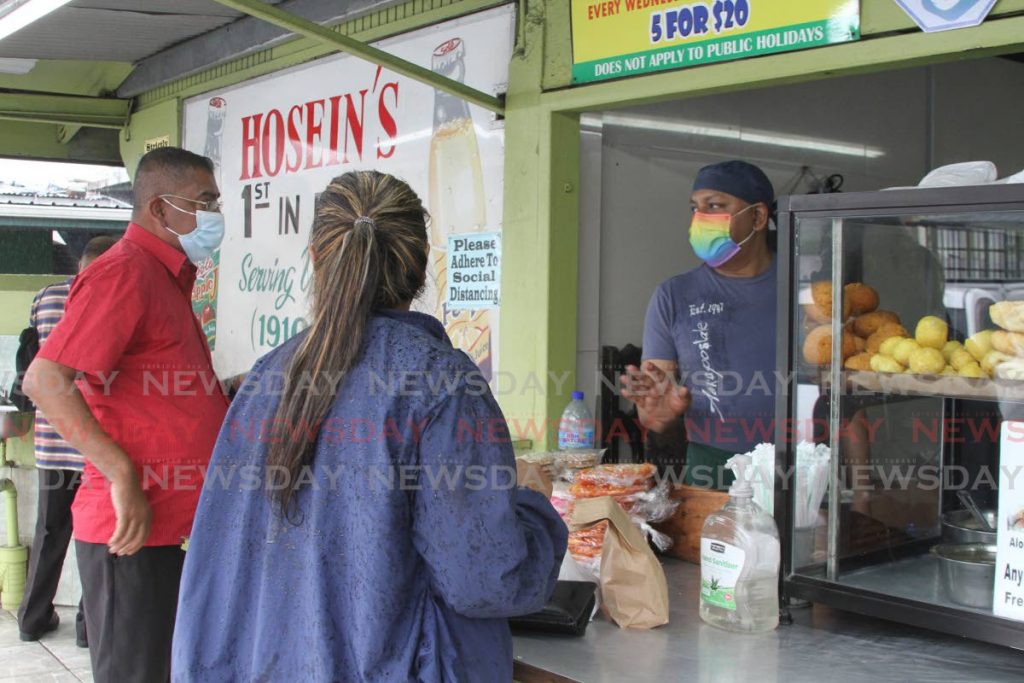Street food vendors absorb oil price increases

Although the price of soy-based cooking oil has increased, roadside food vendors said they have no intention of raising prices on their food items at this time.
Street food vendors of doubles, aloo pies, saheenas, baiganees, kutchories, fries and similar items said they have incurred heavy increases on a five-gallon keg of cooking oil which moved from $160 in some instances to $240 over the last month.
Sunday Newsday visited street food vendors in Chaguanas and Debe on Friday to get an insight into the situation and learnt that while many of the vendors were contemplating increasing their prices, holding off on such a move was necessary until the latest covid19 restrictions are lifted.
They explained the people who were experiencing temporary layoffs due to the closure of various establishments would not be able to pay more for their delicacies. Likewise, they noted that people who still had jobs would also not welcome an increase.
Mr Singh, who wanted to be identified only by his surname, is the owner of Singh’s Delicacies located on the Debe doubles strip along the SS Erin Road. He said he has to absorb the cost to keep his business running and provide employment for his small staff of about five people.
“A month ago, I paid $165 for oil and now it has increased drastically. Raising the price of doubles would be difficult because not all vendors sell at the same price. All my items are sold for $5, and some vendors sell at $3 or $4.
“Right now, because of the country’s economic troubles an increase in anything would not be welcomed. I don’t think now would be a good time. We have to assess the situation properly in order to keep our businesses alive too.”

Owner of Hosein’s Doubles, Sharaz Hosein said, “We only use the vegetable-based oil because it lasts longer, and it is better for this type of cooking. We have no choice but to pay the new cost for oil.
“The owners here (Debe doubles strip) are yet to meet to decide of a way forward. It has to be a collective decision and over the weekend we will meet to discuss the matter further.”
Owner of Hassanli’s – the Green Shed, Sally Manlal said, “We cannot raise prices because of the oil. The economy is not so good, and increase would not be good business for us.”
Some Chaguanas vendors said they were shocked by the increases but cannot afford to make changes at this time.
One vendor, who wished to remain anonymous, who sold along the Chaguanas Main Road, said he will decide after the government’s lifts the latest covid19 restrictions on May 23.
There were mixed views by consumers about the intended increase in prices, where some said yes, others said they would stop purchasing completely, and some did not put much thought into it as yet.
One customer, who did not want to be identified, said he would continue to purchase and understood the need for the street food vendors to increase prices.

“Just like everything else, over time price increases are expected and if the vendors also have to purchase raw materials at a higher cost and decided to increase their product, then I see nothing wrong there.”
Sunday Newsday also attempted to reach some major distributors of cooking oil such as Massy Stores, National Flour Mills (NFM) and Brydens but were unable to get responses.
Managing director of Arima Discount Mart (ADM) Balliram Maharaj said they have increased prices, not only on cooking oil but other products, due to several factors which included shipping constraints brought on by the covid19 pandemic.
ADM is the distributor of Rainbow products, such as parboiled rice, pasta, peas and beans, corned meats, evaporated and condensed milk, canned peas, beans and vegetables, tuna, mackerel and sardines, pre-packed granulated and brown sugar, vegetable soyabean oil, chicken vienna sausage, vinegar, dried peas and beans and dried fruits. These are packaged from imports from Belize.
He said, “The production of the product, such as labour, increases on soy and wheat must have an effect on their products. We bring in goods from Belize and challenges to import have affected us. And this is happening all over the world.
“There is a shortage in supply, there are lack of containers at the ports and shipping rates have gone up. The lack of foreign exchange has also impacted us significantly.”
Maharaj added that they had to increase prices on their products three times between 2020 to present.
“Government did not plan for covid19 expenses and unfortunately this is what we are faced with.”
President of the Supermarkets Association Rajiv Diptee said there have been concerns about the price increases being handed down to supermarkets by local suppliers of foods and goods in all categories of products not just oil. But a maelstrom of variables directly related to covid19, he explained, has affected supply chains: cost of production, cost of inputs of production, production capacity, shipping and credit facilities.
“Our suppliers have indicated to us in no uncertain terms they are unable to shoulder these increases and as a result some lines of product have been cut off as concerns linger about consumer access to price points as well as prioritisation of foreign exchange to purchase goods.”
Diptee said it was a good time for government to consider local substitutions to reduce importations and ascertain self-sustainability.
“What we see now is the need for premium quality thereby allowing for niche markets to develop to create opportunities for entrepreneurs.
“This will allow for a gradual shift in the paradigm in the slow but inevitable road to some form of self-sustainability while chipping away at the food import bill. This self-calibration will continue to take place as long as these exigent challenges continue to exist.”
Sunday Newsday also tried to reach out to NFM CEO Ian Mitchell about cooking oil prices via WhatsApp but the questions remained unanswered.

Comments
"Street food vendors absorb oil price increases"